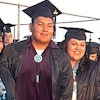The principal and superintendent of Loleta Elementary School in California’s Humboldt County grabbed a Native American student by the ear and asked, “See how red it’s getting?” The school secretary said students behaved like “wild Indians.” Native American students have been suspended for seemingly minor infractions ― breaking crayons and kicking a ball on a roof. Native American students are forced to finish their lunches, including having to drink spoiled milk while White students can throw out unfinished food.
These are some of the charges in a complaint filed with the Office for Civil Rights by the California Indian Legal Services, along with the American Civil Liberties Union and the National Center for Youth Law at the end of last year. The latter two groups also filed a federal lawsuit against the Eureka City Schools district charging that school officials discriminate against African American and Native American students.
The schools are in Humboldt County, a predominantly rural area, with one of the highest populations of Native Americans in the state ― around six percent. At Loleta, about a third of the students are members of federally recognized tribes, and Delia Parr, an attorney with the California Indian Legal Services, says because of the way these students are treated, many parents who were able to, have transferred their children to neighboring schools, leaving the most vulnerable behind. Parr says they filed this complaint because the school officials had ignored previous complaints, and this felt like the only way to effect change.
“Rather than recognizing that these children are members of this community, there’s continued disenfranchisement,” Parr said. “The school is not following the education code. … This just perpetuates the cycle for a community that suffers from historical trauma.”
Humboldt, in the far north of the state, has a bad record of sending kids to college, but it’s particularly abysmal for Native Americans, with fewer than 10 students qualifying for either California State University or the University of California system.
Having only single digits of kids ready for higher education ties directly to their treatment in elementary school, says Mat Matson, a member of the tribal council of the Bear River Band of Rohnerville Rancheria, who filed the complaint against Loleta officials, along with the Wiyot Tribe. Tribal leaders are trying to do everything they can to provide educational support for the children, such as running a resource library and offering tutoring, he says ― but they need the school to work with, not against them.




















